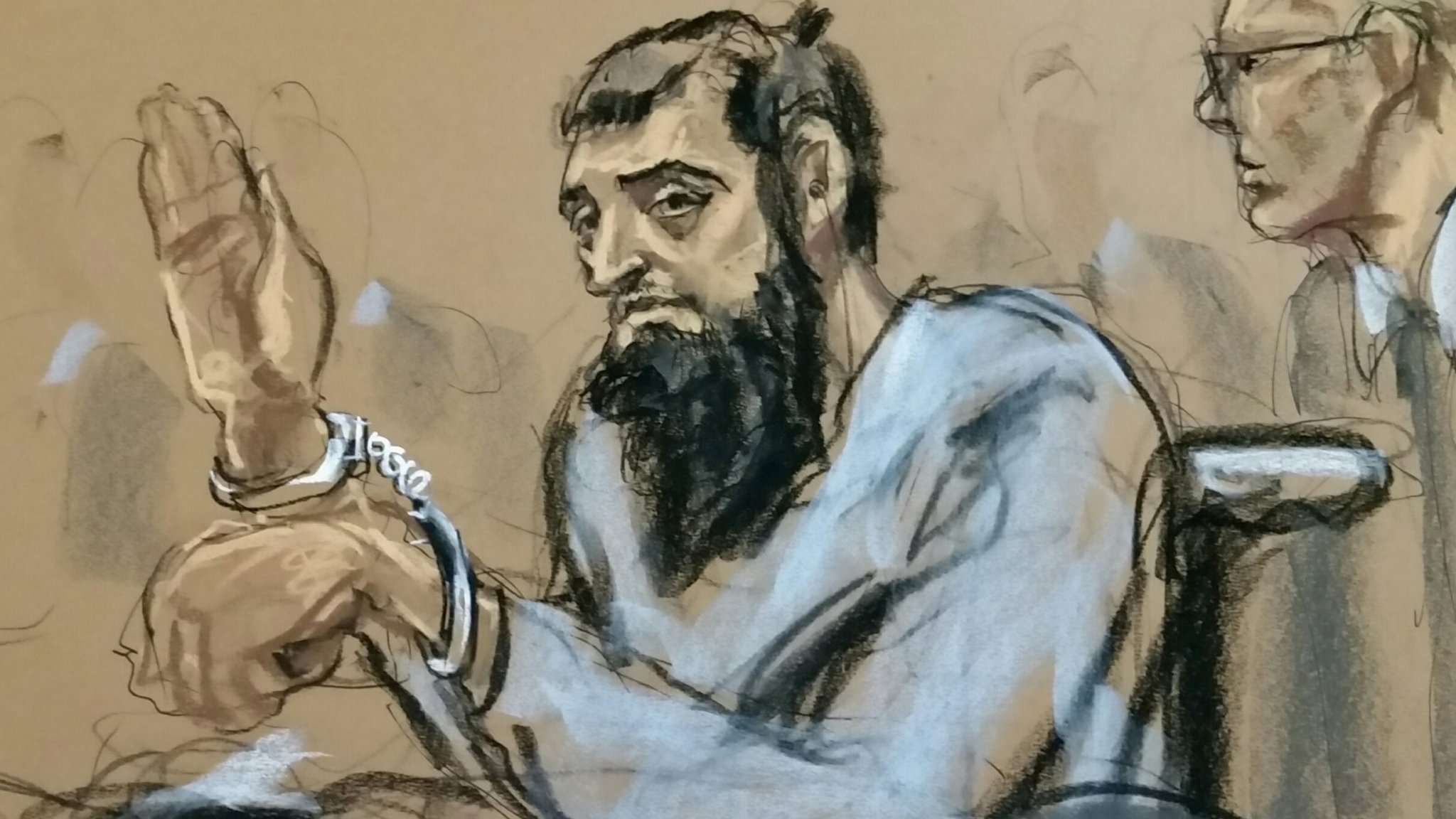

Media playback is unsupported on your device
US President Donald Trump has repeated calls for the suspect in the New York truck attack to get the death penalty.
But Mr Trump backed away from his call a day earlier to send Sayfullo Saipov to Guantanamo Bay, saying “that process takes much longer”.
The suspect told police he “felt good” about Tuesday’s Halloween attack and wanted to kill as many as possible.
The 29-year-old allegedly drove a rented pick-up along a Manhattan bike path, killing eight people.
The victims were five Argentines who had travelled to New York to celebrate 30 years since their high school graduation, a young mother from Belgium and two Americans.
Mr Saipov, an Uzbek immigrant, was shot at the scene by police, according to officials. Investigators say he told them he was inspired by the Islamic State militant group (IS).
Could Trump’s remarks jeopardise a fair trial?
Mr Saipov, who appeared in court on Wednesday in a wheelchair, faces federal terrorism charges, which means the government could override New York state’s ban on capital punishment.
“There is also something appropriate about keeping him in the home of the horrible crime he committed,” tweeted the Republican president, a native New Yorker, on Thursday morning.
Repeating his initial call tweeted overnight for Mr Saipov to be executed, Mr Trump added: “Should move fast. DEATH PENALTY!”
However, some legal commentators suggest that Mr Trump’s comments could be seen as prejudicial to a trial.
Earlier this week, a military judge said he would consider a lighter sentence for Bowe Bergdahl, a US soldier who deserted his Afghan base, because of Mr Trump’s previous urging for that defendant to face the death penalty.
Is there a precedent for this?
It is unusual for US presidents to hold forth on pending criminal cases, but not unheard of.
In 1970, lawyers for mass murderer Charles Manson called for a mistrial after President Richard Nixon declared the cult leader guilty – in the middle of his trial.
Nixon backtracked and the judge allowed the case to go ahead.
Mr Trump has previously called for capital punishment to be applied in high-profile cases.
In 1989, when a group of five black and Latino men were charged with a particularly brutal rape of a woman in New York City, Mr Trump paid $85,000 for an ad in city newspapers with the headline “Bring Back the Death Penalty!”
The five defendants were later cleared by DNA evidence.
What did New York suspect say?
Prosecutors say Mr Saipov spoke freely to them, waiving his right to avoid self-incrimination while in custody.
According to federal court papers, he said:
- The attack was a year in the planning and he carried out a trial run with a rental truck last month
- He originally planned to target the Brooklyn Bridge as well
- He wanted to display IS flags on the truck, but decided not to draw attention to himself
- He was inspired by 90 graphic and violent propaganda videos found on his phone – in particular, one in which IS leader Abu Bakr al-Baghdadi asks what Muslims are doing to avenge deaths in Iraq.
Mr Saipov was charged with one count of providing material support and resources to IS and another count of violence and destruction of motor vehicles.
Was he on law enforcement’s radar?
CBS News quotes an intelligence source as saying Mr Saipov was known to US authorities after his name was associated with the subjects of FBI counter-terrorism investigations in 2015.
The source says the suspect had some contact with individuals who were considered radicalised extremists, at least one of whom was Uzbek. It is unclear whether those being investigated were in the US or overseas.

Media playback is unsupported on your device
It is not known if Mr Saipov, who was not the main focus of the investigation, was interviewed at that time by the FBI.
The FBI meanwhile says they have located a second Uzbek man, 32-year-old Mukhammadzoir Kadirov, who was wanted for questioning in connection with Tuesday’s attack.
Who were the victims?
The five Argentines – all men aged 48 or 49 – were named as Hernán Diego Mendoza, Diego Enrique Angelini, Alejandro Damián Pagnucco, Ariel Erlij and Hernán Ferrucci.
Belgian officials said Anne-Laure Decadt, a 31-year-old mother-of-two from Staden in Flanders, was also killed. Three Belgians were wounded.
The two Americans have been identified as Darren Drake, 32, and Nicholas Cleves, 23.
Twelve others were injured, four of whom remain in critical condition.
Note: This story is auto-generated from BBC syndicated feed and has not been edited by AFRICA PRIME NEWS